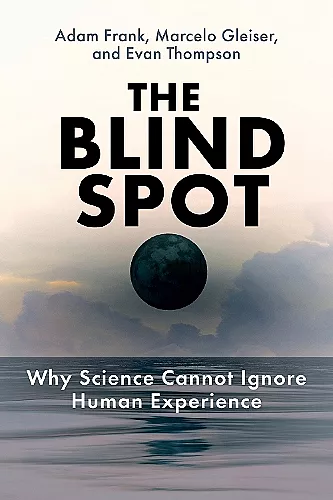The Blind Spot
Why Science Cannot Ignore Human Experience
Marcelo Gleiser author Adam Frank author
Format:Hardback
Publisher:MIT Press Ltd
Published:5th Mar '24
Should be back in stock very soon

A compelling argument for including the human perspective within science, and for how human experience makes science possible.
“This is by far the best book I've read this year.”
—Michael Pollan, Professor of the Practice of Non-fiction, Harvard University; #1 New York Times bestselling author
“(A) stimulating manifesto for changing the way we look at things.”
—Wall Street Journal
It’s tempting to think that science gives us a God’s-eye view of reality. But we neglect the place of human experience at our peril. In The Blind Spot, astrophysicist Adam Frank, theoretical physicist Marcelo Gleiser, and philosopher Evan Thompsoncall for a revolutionary scientific worldview, where science includes—rather than ignores or tries not to see—humanity’s lived experience as an inescapable part of our search for objective truth.The authors present science not as discovering an absolute reality but rather as a highly refined, constantly evolving form of human experience. They urge practitioners to reframe how science works for the sake of our future in the face of the planetary climate crisis and increasing science denialism.
Since the dawn of the Enlightenment, humanity has looked to science to tell us who we are, where we come from, and where we’re going, but we’ve gotten stuck thinking we can know the universe from outside our position in it. When we try to understand reality only through external physical things imagined from this outside position, we lose sight of the necessity of experience. This is the Blind Spot, which the authors show lies behind our scientific conundrums about time and the origin of the universe, quantum physics, life, AI and the mind, consciousness, and Earth as a planetary system. The authors propose an alternative vision: scientific knowledge is a self-correcting narrative made from the world and our experience of it evolving together. To finally “see” the Blind Spot is to awaken from a delusion of absolute knowledge and to see how reality and experience intertwine.
The Blind Spot goes where no science book goes, urging us to create a new scientific culture that views ourselves both as an expression of nature and as a source of nature’s self-understanding, so that humanity can flourish in the new millennium.
“This is a very important book that has the potential to become a classic text . . . Being aware of the Blind Spot is a necessary step toward reinscribing human experience back into science’s core.”
—Science
“This is by far the best book I've read this year.”
—Michael Pollan, Professor of the Practice of Non-fiction, Harvard University; #1 New York Times bestselling author
“(A) stimulating manifesto for changing the way we look at things.”
—Wall Street Journal
“The Blind Spot makes a rich and complex philosophical argument, but it also has major practical implications, both for how we should do science and for how it should be presented to the public.”
—Times Higher Education
“Breathtaking . . . The discussion is so clear, well-paced, and witty that I’d be tempted to describe it as a breezy read if that didn’t risk coming across as a slight. Nonscientists will appreciate sparklingly clear accounts of seemingly forbidding concepts . . . The Blind Spot uses philosophical arguments to resolve scientific puzzles that threaten the integrity of science itself. We philosophers have long dreamed of finding a way to demonstrate the interdependence of the sciences and the humanities. Well, here it is.”
—Los Angeles Review of Books
“I recommend this book heartily. It puts its finger on the most fundamental philosophical questions and articulates a powerful, unified diagnosis of a remarkable cluster of current scientific problems. It challenges authority and orthodoxy in the best way. You may not initially agree with the authors, but once you see the Blind Spot, you cannot look away.”
—Nature Physics
ISBN: 9780262048804
Dimensions: unknown
Weight: unknown
328 pages